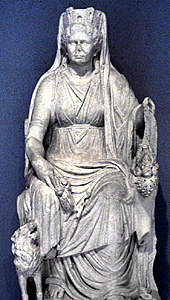Megalesian Games in Honor of Cybele
 Megalesiacae spectacula: The
Megalesian games were celebrated in Rome from April 4-10 in honor of the
Phrygian goddess Cybele, known in Rome as Magna Mater, “the great
mother” (in Greek megalê means “great, exalted”).
This was a season for general feasting and rejoicing in Rome, a time when
wealthy Romans invited their friends for such extravagant banquets that the
Senate passed a rule limiting such expenditures in 161 BCE. Thus the time
provides a fitting setting for Juvenal's satire about living within his means
and inviting his friend to a simple meal that is appropriate to his status.
This festival was primarily devoted to dramatic performance (ludi
scaenici), but chariot races (ludi circenses) were held in the
Circus on the last day.
Megalesiacae spectacula: The
Megalesian games were celebrated in Rome from April 4-10 in honor of the
Phrygian goddess Cybele, known in Rome as Magna Mater, “the great
mother” (in Greek megalê means “great, exalted”).
This was a season for general feasting and rejoicing in Rome, a time when
wealthy Romans invited their friends for such extravagant banquets that the
Senate passed a rule limiting such expenditures in 161 BCE. Thus the time
provides a fitting setting for Juvenal's satire about living within his means
and inviting his friend to a simple meal that is appropriate to his status.
This festival was primarily devoted to dramatic performance (ludi
scaenici), but chariot races (ludi circenses) were held in the
Circus on the last day.
This statue is a portrait of a Roman matron who is depicted with the
attributes of the goddess Cybele. Note especially the mural crown, modeled on
the walls of a city, which indicates the goddess's connection with war. She was
primarily associated with the fertility of wild nature (hence her connection
with mountains like Mt. Ida in Crete) and often accompanied by lions; her rites
had an ecstatic character and her Asiatic priests, called Galli, were
famous for their self-castration.
 Megalesiacae spectacula: The
Megalesian games were celebrated in Rome from April 4-10 in honor of the
Phrygian goddess Cybele, known in Rome as Magna Mater, “the great
mother” (in Greek megalê means “great, exalted”).
This was a season for general feasting and rejoicing in Rome, a time when
wealthy Romans invited their friends for such extravagant banquets that the
Senate passed a rule limiting such expenditures in 161 BCE. Thus the time
provides a fitting setting for Juvenal's satire about living within his means
and inviting his friend to a simple meal that is appropriate to his status.
This festival was primarily devoted to dramatic performance (ludi
scaenici), but chariot races (ludi circenses) were held in the
Circus on the last day.
Megalesiacae spectacula: The
Megalesian games were celebrated in Rome from April 4-10 in honor of the
Phrygian goddess Cybele, known in Rome as Magna Mater, “the great
mother” (in Greek megalê means “great, exalted”).
This was a season for general feasting and rejoicing in Rome, a time when
wealthy Romans invited their friends for such extravagant banquets that the
Senate passed a rule limiting such expenditures in 161 BCE. Thus the time
provides a fitting setting for Juvenal's satire about living within his means
and inviting his friend to a simple meal that is appropriate to his status.
This festival was primarily devoted to dramatic performance (ludi
scaenici), but chariot races (ludi circenses) were held in the
Circus on the last day.